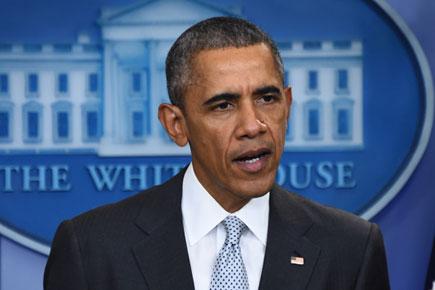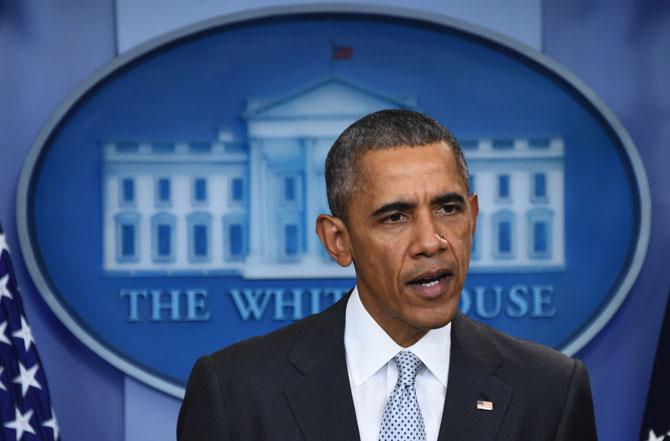The Paris terrorist attacks seem likely to compel President Barack Obama to consider military escalation against the Islamic State group in Iraq and Syria

US President Barack Obama speaks to the press in Washington, DC on November 13, 2015, after being informed about a series of deadly attacks that rocked Paris. AFP PHOTO/ JIM WATSON
Washington: The Paris terrorist attacks seem likely to compel President Barack Obama to consider military escalation against the Islamic State group in Iraq and Syria.
ADVERTISEMENT
Also read: World leaders express outrage at Paris attacks
But that probably will not mean dramatic moves like launching a US or international ground offensive or accelerating aerial bombing in hopes of eliminating the global threat of violent extremism. "You aren't going to bomb ISIS back to the Stone Age," Anthony Cordesman, a longtime Middle East analyst, said yestreday.

US President Barack Obama speaks to the press in Washington, DC on November 13, 2015, after being informed about a series of deadly attacks that rocked Paris. AFP PHOTO/ JIM WATSON
Cordesman and other American defense analysts said Obama may deepen US involvement incrementally by, for example, embedding US military advisers closer to the front lines with Iraqi forces and with anti-IS fighters in Syria. But that and similar moves to intensify US support for local forces is unlikely to produce quick results.
Also read: US President Barack Obama condemns Paris terror attacks
As Cordesman sees it, years of tragic terrorist attacks like Paris are almost inevitable, and there are no near-term solutions. Stephen Biddle, a George Washington University professor of international affairs, said the Paris attack may create a political imperative to do more militarily against IS, but he thinks it would be a mistake to launch a US ground war.
"To defeat ISIL decisively would require hundreds of thousands of Western ground troops, but nobody thinks the ISIL threat warrants that scale of commitment, and in fact it doesn't," Biddle said. At the core of the US strategy in Iraq is a belief that unless local forces are empowered to retake and secure their own territory, any military gains the US.
Also read: Paris attacks sees 127 dead, one terrorist identified as French national
Could make by leading the charge would be short-lived. In Syria, Obama had been unwilling to get more involved in a civil war, although he recently agreed to send a few dozen special operations forces. One new wrinkle since Friday's attacks in Paris is the prospect of France asking its NATO allies to come to its aid, invoking the 28 members' treaty obligation to consider an armed attack on one member as an attack against them all.
That has happened only once in NATO's 66-year history: in the aftermath of the Septemebr. 11, 2001, attacks against the U.S. James Stavridis, the retired Navy admiral who served as NATO's top commander in Europe from 2009 to 2013, said NATO should play a military role now. "NATO's actions need to be deliberate, meaningful and at a significant scale," Stavridis said by email, adding that consultations among the allies should begin shortly.
 Subscribe today by clicking the link and stay updated with the latest news!" Click here!
Subscribe today by clicking the link and stay updated with the latest news!" Click here!






